As an Amazon Associate I earn from qualifying purchases.
It took me a long time to post a pasty recipe here, largely because Cornish pasties are one of my favorite lunches and I wanted to get things right. And while technically this is a venison pasty, don’t get hung up on that. Any meat will do. Or use mushrooms if you are a vegetarian.
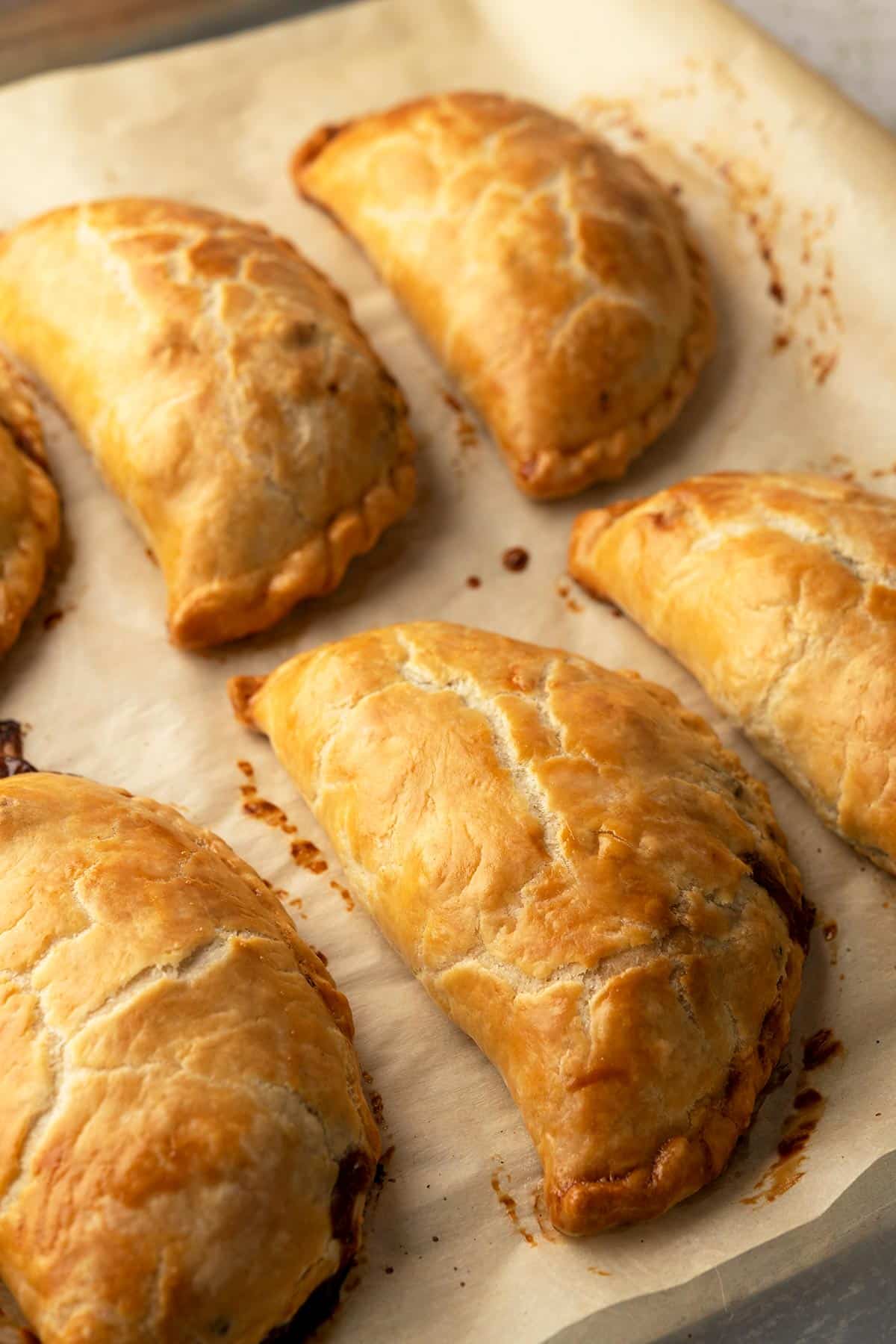
The world loves mobile pockets of awesome, from Mexican empanadas and Finnish meat pies to Chinese steamed pork buns to, well, yes, actual Hot Pockets. The portability and versatility of them are tailor made for busy humans.
The pasty falls firmly into this category. A pasty, variously pronounced “pah-stee,” or “pay-stee,” but mostly with the nasal flat “a” that makes saying pasty a bit like the braying of a sheep. Originally from Cornwall, this is the quintessential lunch of miners. And miner brought pasties wherever they went.
There is an official pasty recipe, both for the dough and the filling. The official filling is skirt steak, waxy potatoes, rutabagas, onions and salt and pepper. That’s it. If this is the filling you want, you can find details for it here.
But each group of miners created their own pasty recipe as they migrated around the world. You can find them in Michigan’s Upper Peninsula, Butte, Montana, Wisconsin and Kentucky.
Wisconsin is where I learned about them, at a place called Myles Teddywedgers at the top of State Street. On a cold, Wisconsin day, a big ole’ pasty really hit the spot, especially since I was running marathons at the time. He had the traditional pasty, which is what I ate most, but since then — this was back in 1993 — they have played with the fillings to their hearts content. Doubtless, Cornishmen would be appalled. Sorry not sorry.
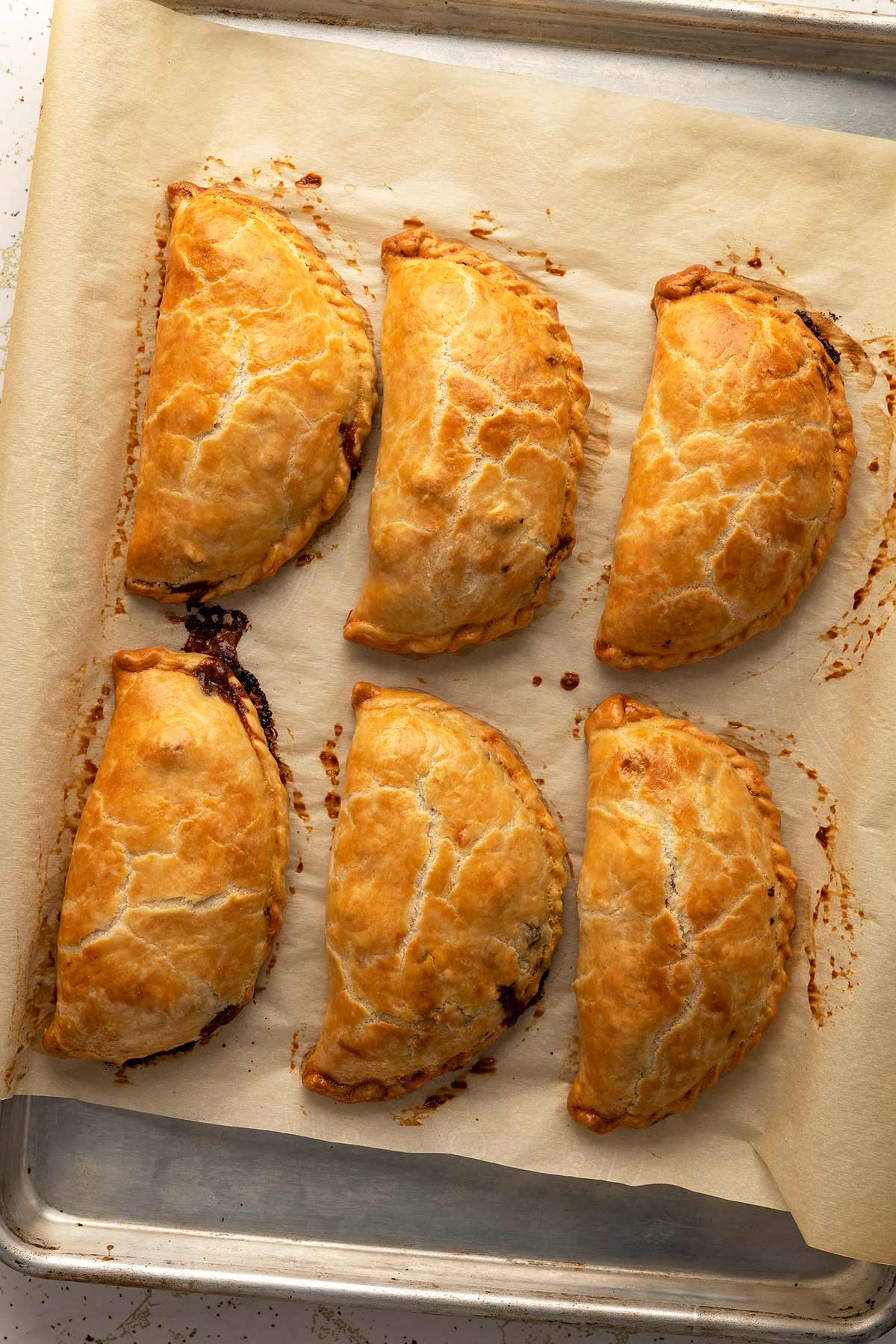
Later I learned about Hidalgo, in Mexico. Cornish miners settled there, too, and they brought their pasty recipe with them. But as you can imagine, the Mexicans would think that receta was sosa, bland. Instead, they took the basic dough recipe and filled it with things, wondrous things. Pork guisados, beef stews, poblanos and cheese, you name it. The pasty was set free!
So this is where I want you to go. Follow my pasty recipe only as a guide, although the dough is very good and is pretty close to the traditional in Cornwall. Fill it with whatever you wish. Some ideas:
- For something close to classic, fill your pasties with my venison and kidney pie recipe. No kidneys? Leave them out.
- I absolutely am in love with pasties filled with venison carne guisada, a recipe from Durango, north and west of Hidalgo.
- Any of my venison stew recipes will work as a filling, once you cook them down.
- Cochinita pibil is a fantastic filling, as is wild turkey carnitas or venison barbacoa.
- Mince from Scottish mince and tatties would be perfect. I make mine with venison, but any ground meat would work.
- Not into meat? My mushroom pierogi filling works great in a pasty.
Pasty Recipe Tips
But some more general tips to help you make your own pasty recipe:
- It has to be thick. So if you start with a stew, cook it down, so it gels up in the fridge. That will make it easier to fill when you make them, and less runny when you eat them.
- Cheese, while not traditional, is always a good idea. If you like cheese, that it. Melty cheese is really what you want.
- The pieces of whatever should not be overly large. Pasties are big empanadas, sure, but a big honkin’ piece of rutabaga will break the dough when you fold it over.
- Add soft herbs like parsley or cilantro once the filling cools. That will keep them bright and fresh when you bake them.
- The egg wash glaze really makes a difference, if only visually. It looks super cool. And if you don’t do dairy, just whisk the eggs with water.
Finally, no matter what pasty recipe you come up with, you will want to crimp the edges of your pasties the way they do in Cornwall. This is a fantastic video showing the process. (The crimping is at the 1:50 mark)
Other Meat Pies to Try
I have a wide selection of other fantastic meat pies you might want to try. Some are bready, others use pie crust, some use other doughs. Keep in mind the filling meat can really be whatever you have lying around. Some of my favorites include classic British venison mincemeat pies, British game pie and German bierocks. Imagine a nice bread roll stuffed with meat, onions and sauerkraut.
If you liked this recipe, please leave a ⭐️⭐️⭐️⭐️⭐️ rating and a comment below; I’d love to hear how everything went. If you’re on Instagram, share a picture and tag me at huntgathercook.
Venison Pasties
Ingredients
DOUGH
- 500 grams bread flour, about 17 ounces
- 2 teaspoons salt
- 120 grams duck fat, lard or rendered beef fat, about 4 ounces
- 120 grams butter, about 4 ounces
- 175 milliliters cold water, about 6 fluid ounces
FILLING
- 1 pound venison, diced
- 1/2 pound Yukon Gold potatoes, peeled and diced
- 1/2 pound rutabagas, peeled and diced
- 1 large yellow onion, chopped
- Salt and black pepper to taste
GLAZE
- 2 eggs, lightly beaten
- 2 tablespoons milk or water
Instructions
DOUGH
- Mix the flour and salt together. Add the two fats, and work them into the flour with your fingers until everything looks like a coarse meal. Pour in the cold water and knead for several minutes, until you get a smooth dough.
- Squeeze off 10 equally sized balls of dough. Set them in a plastic bag and put that in the fridge for 3 hours.
FILLING
- Mix all the ingredients together in a bowl. That's it. In this case, you put raw ingredients into the pasty and they cook as the dough cooks. I either do this, or add a premade filling as I mention in the headnotes above. Whatever you use, use the recipe above to give you a sense of how much filling you will need.
MAKE THE PASTIES
- You can do one of two things. You can roll each ball out into a disk, which is traditional, or, do what I do and use a tortilla press to flatten out the balls into perfect disks every time. It's a great hack!
- Set filling in each disk and close them into half-moons. Press the edges, and try to get any big air pockets out. Crimp the edges as shown in the video in the text above. Set each pasty on a piece of parchment paper on a baking sheet. Preheat the oven to 360°F.
- Whisk together the glaze and paint each pasty with it. Bake your pasties for 50 minutes or so, taking a look about 40 minutes in -- if they are not browning well, up the temperature to 400°F for this final bit. Remove and let cool on a rack for at least 5 minutes before eating.
Notes
Nutrition
Nutrition information is automatically calculated, so should only be used as an approximation.


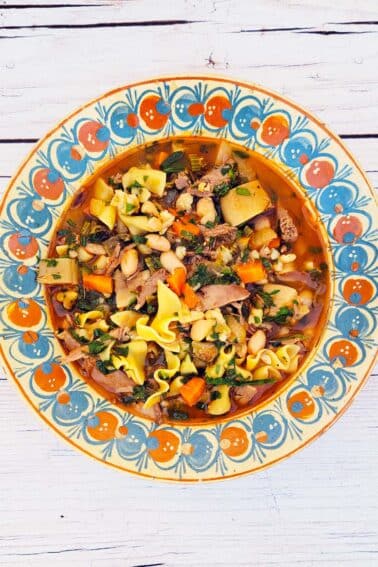
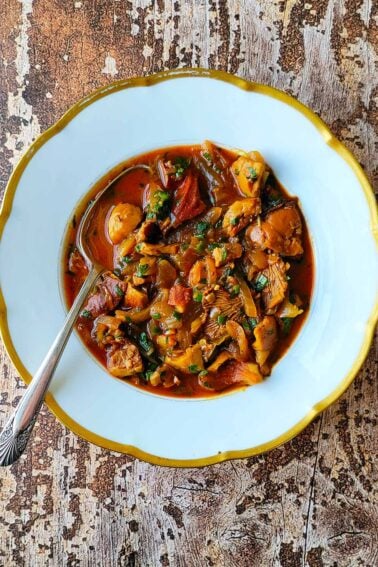
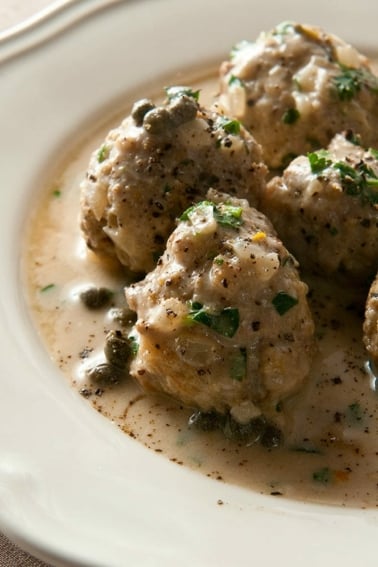
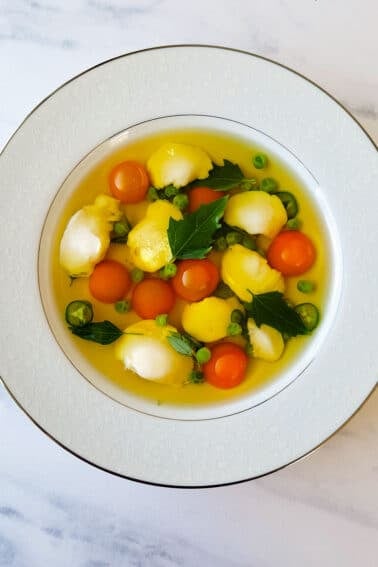
Excellent recipe. I tried it using your methods and measurements on the dough, and it was spot-on. The recipe is very versatile, as I have used it with several different fillings. Thank you for being so thorough and spending time on the minutiae. It was a great help.
Hank, about the lard in the pastry: I have access to freshly rendered lard from my Mexican grocery but it is very loose- not like the hydrogenated lard at grocery Is it ok use a more liquid lard and will it affect the breadcrumb texture of the proto-dough?
Have you been to Cosetta’s yet?
Using the dough recipe and the instructions, I filled mine with Hank’s Venison Shepherd’s Pie filling instead of the traditional one. These are awesome, no idea why I haven’t been making handheld pie-things until now. The dough is surprisingly sturdy for a pie crust, most pastry I’m used to working with is easier to tear and harder to work with as it warms up, this was pretty easy. The crust also reheated well, still crisp on day 2 for leftovers. I will definitely be experimenting with all sorts of fillings in the future!
Just finished my second batch of these and they again turned out amazing! The dough is really phenomenal and simple to make. And after a family dinner I still have a weeks worth of lunches!
Ahhhhh …… Venison Pasties …… First mentioned in Devon, UK in the 1500’s as part of the celebration to crown Henry VIII. Great recipe, but add a little white pepper as well as freshly ground black pepper as the game meat lends itself very well to that extra kick. Cornish Pasties do indeed have a wide and thick crimped edge so that the miners could safely eat the filling and throw away the dirty edging pastry. Devon Pasties normally have a delicate crimped edge – they were considered food fit for a king and venison would only have been served to the wealthy. Of course, go North in England and you will find “Sea Pie” …… Make your stew, and then place a big plate sized top of pastry (shortcrust or suet) floating on top of the stew and bake in the oven. A great hearty meal for a working man often served with pickled red cabbage.
In the mid-90s when I lived in Madison, I would sometimes walk from my home on the west side of the Capitol to hang out with friends on the near East side. If it was wintertime, I’d stop at the top of State Street and pick up a pasty at Myles Teddywedgers. I can remember the enjoyment of being cold but peeling back that thin tin foil and eating it as I walked across Capitol Square (totally team ketchup tho). Thanks for the memories! Oh and I have cooked your Horn of Africa Ethiopian chicken (on the Simply Recipes site) so many times over the years and everyone loves it every time!!! Thanks!
Hank,
I chuckled at your pronunciation help. Those of us living in the Upper Peninsula of Michigan always know someone is not a native when they ask, “where can I get good paystee”? Answer: “at the gentlemen’s club in Wisconsin”. It is a hard “ar” in pasty”. “parrstee”
Can’t wait to try this recipe. Any harm in letting the dough sit overnight?
Bill: If you keep it in a plastic bag in the fridge overnight it should be fine.
This is the best recipe I’ve used. The precision of the measurements makes them come out perfect and the tortilla press suggestion is brilliant. So tasty!
My experience with Pasty was in Devon, Valencia and at my mother’s table in Florida. The most unusual to me was the tuna version in Valencia. We were out looking for breakfast to take back to the rental and came across a tiny place with different pasty and bread offerings. The tuna and tomato filling was my favorite.
You ran marathons… of course you did. I’d be a renaissance man, too, I bet… if I weren’t so lazy.
Had to chuckle when I saw the dough recipe in metric and the filling recipe in American!
Gary: I know, I am quirky like that. But baking is a more precise thing than regular cooking…
I don’t know about the rest of you, but I’m just going to make a stop at Teddywedgers soon. Been in Madison over 5 years and never knew of them! A brother/sister team has taken over ownership now.
Can these be frozen before baking? Do they turn out gummy? Or baked then reheated?
As someone who’s originally from Cornwall, I’m always skeptical about Pasty recipes, but this one’s very faithful to a true Cornish Pasty, as confirmed by the links Hank has provided. As they say back home, it will make a proper ‘ansome job.
Getting the crimp right is most important, traditionally the miners ate the centre and tossed the crimp as their hands were covered in Arsenic and other nasties. These days it’s enjoyed with the rest of the pasty.
I would however like to take exception to the Team Sauce/Gravy comment above. As hinted at above, a pasty should be eaten from the hand, ideally in a paper bag or a handkerchief and not on a plate with a knife and fork, therefore Sauce and Gravy don’t come into the equation 🙂
Mike: That’s a Upper Peninsula of Michigan thing, where pasties have been loved for about 150 years. 😉
Meats also were varied in the U.P., but rutabaga is always a must-have. It just isn’t a pasty without swede.
I use my grandmother’s recipe for her traditional Cornish Pasty. My family hails from the Gladstone area of the Upper Peninsula, but I would love to try out a venison version! Could you recommend some places where Venison might be for sale? I don’t have access to locally hunted venison where I am now. Also, do you recommend farm-raised vs wild-caught venison for your recipe?
Christine: Hey there. Honestly, I’d just use beef, unless you know a hunter who can give you some venison. Buying venison is very expensive. Oh, and it has to be farmed. Selling true wild game has been illegal in the United States for more than 100 years.
What size tortilla press do you use for pasties?
Patrick: Not the smallest. Most MexiMarts have a small one and a larger one, I use the larger one. That said, you don’t need a huge tlayuda press for this.
Now the real pastie question…Team Gravy or Team Ketchup?
Lance: Team Gravy!
Team English (Brown HP) sauce. Or at worst US steak sauce if English HP or Daddies sauce unavailable. Beats ketchup hands down lol